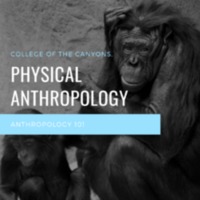Physical Anthropology
Dublin Core
Title
Subject
Description
Anthropology is the study of what makes us human. Anthropologists take a broad approach to understanding
the many different aspects of the human experience, which we call holism. They consider the past, through
archaeology, to see how human groups lived hundreds or thousands of years ago and what was important to
them. They consider what makes up our biological bodies and genetics, as well as our bones, diet, and health.
Anthropologists also compare humans with other animals (most often, other primates like monkeys and
chimpanzees) to see what we have in common with them and what makes us unique. Even though nearly all
humans need the same things to survive, like food, water, and companionship, the ways people meet these
needs can be very different. For example, everyone needs to eat, but people eat different foods and get food in
different ways. So anthropologists look at how different groups of people get food, prepare it, and share it.
World hunger is not a problem of production but social barriers to distribution, and that Amartya Sen won a
Nobel Prize for showing this was the case for all of the 20th century’s famines. Anthropologists also try to
understand how people interact in social relationships (for example with families and friends).
the many different aspects of the human experience, which we call holism. They consider the past, through
archaeology, to see how human groups lived hundreds or thousands of years ago and what was important to
them. They consider what makes up our biological bodies and genetics, as well as our bones, diet, and health.
Anthropologists also compare humans with other animals (most often, other primates like monkeys and
chimpanzees) to see what we have in common with them and what makes us unique. Even though nearly all
humans need the same things to survive, like food, water, and companionship, the ways people meet these
needs can be very different. For example, everyone needs to eat, but people eat different foods and get food in
different ways. So anthropologists look at how different groups of people get food, prepare it, and share it.
World hunger is not a problem of production but social barriers to distribution, and that Amartya Sen won a
Nobel Prize for showing this was the case for all of the 20th century’s famines. Anthropologists also try to
understand how people interact in social relationships (for example with families and friends).
Creator
Source
https://www.canyons.edu/Offices/DistanceLearning/OER/Documents/Antrhopology
Publisher
Date
2018
Contributor
Baihaqi
Rights
Creative Commons
Format
PDF
Language
English
Type
Files
Collection
Citation
College of the Canyons, “Physical Anthropology,” Open Educational Resources (OER) , accessed March 1, 2026, https://oer.uinsyahada.ac.id/items/show/2397.


